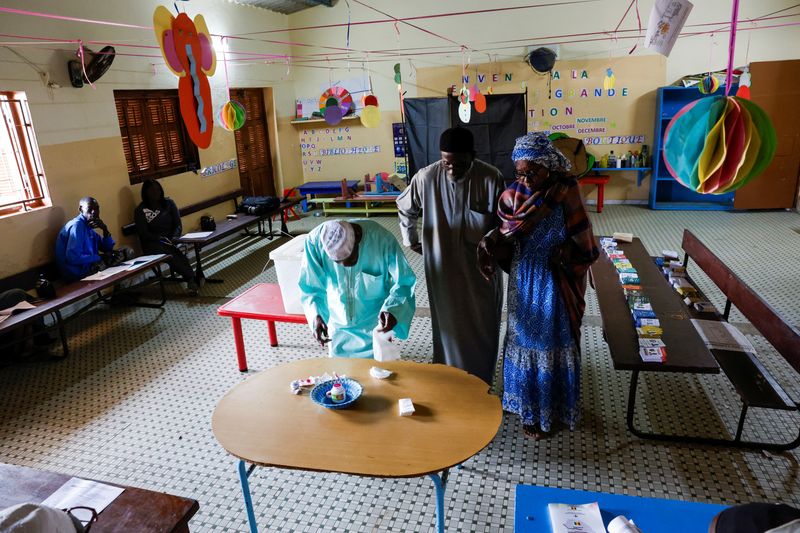
©Reuters. Voters prepare to cast their votes during the presidential election at the Ecole HLM Grand Medine polling station in Dakar, Senegal, March 24, 2024. REUTERS/Luc Gnago
2/9
By Diadie Ba and Portia Crowe
DAKAR (Reuters) – Voting in Senegal’s postponed presidential election took place on Sunday, with many hoping it will bring change after a turbulent political period that has triggered violent anti-government protests and increased support for the opposition.
At stake is the potential end of a regime that has promoted investor-friendly policies but failed to ease economic hardship in one of West Africa’s most stable coup-prone democracies just as it is poised to become a producer of oil and gas.
Nineteen candidates are vying to replace President Macky Sall, who resigned after a second term marred by unrest over the trial of opposition leader Ousmane Sonko and concerns that Sall wanted to extend his mandate beyond the constitutional limit.
The incumbent president is not on the ballot for the first time in Senegal’s history. His governing coalition has chosen former prime minister Amadou Ba, 62, as its candidate.
About 7.3 million people are registered to vote. In the capital Dakar, hundreds of voters patiently lined up hours before the polls opened promptly at 0800 GMT.
In the Ngor neighborhood, overlooking the ocean, fisherman Alioune Samba, 66, said he will vote for the change everyone wants.
“Food, water, school; everything is expensive with the low income we have in Senegal,” the father of three said.
Polls close at 6pm GMT and provisional results are expected by March 26. Election offices will begin releasing their tallies Sunday evening.
Sonko, in prison until recently, was disqualified from the race due to a defamation conviction. He supports the co-creator of his now-dissolved Pastef party, Bassirou Diomaye Faye, who was also arrested almost a year ago on charges including defamation and contempt of court.
An amnesty law passed this month allowed their release just days before the vote. They campaigned together under the slogan “Diomaye is Sonko”. Some high-profile politicians and opposition candidates supported Faye’s candidacy.
“The population is choosing between continuation and rupture,” Faye said after casting her vote, urging the contenders to accept the winner.
Other candidates include former Dakar mayor Khalifa Sall (no relation to the outgoing president), businesswoman Anta Babacar Ngom – the only woman running – and Idrissa Seck, second in the 2019 elections.
“Senegal remains a democratic country, so I am very proud,” Ngom said after the vote, reiterating his promise to restructure the economy and protect democratic rights.
Without opinion polls it is unclear whether any candidate will get the greater than 50% majority needed to avoid a runoff.
“DIOMAYE IS SONKO”
Macky Sall, first elected in 2012, leaves after a decline in popularity that worsened when the authorities tried to postpone the vote until December. It was originally scheduled for February 25th.
The move fueled unrest and concerns about authoritarian expansion in a nation of around 18 million people, prompting Senegal’s Constitutional Council to decide the vote should go ahead before Sall’s term ends on April 2.
After the vote, Ba called for peace and expressed his desire for the Senegalese people to find their next president soon and calmly resume daily life.
He was booed as he left the polling station.
Sonko, third in the 2019 election, is particularly popular among urban youth frustrated by the lack of jobs and high costs of living in a country where 60% of the population is under 25.
Most of Sonko’s supporters are expected to vote for Faye, analysts say.
“We are confident that at the end of this day our victory will be blinding,” he said after voting in the southern town of Zinguinchor, where he is mayor.
Faye promised to eradicate corruption, restore stability and prioritize economic sovereignty.
But some of his promises, such as plans to renegotiate oil contracts just as Senegal is about to begin offshore oil and gas production, have raised concerns about the country’s image as a destination for investors.